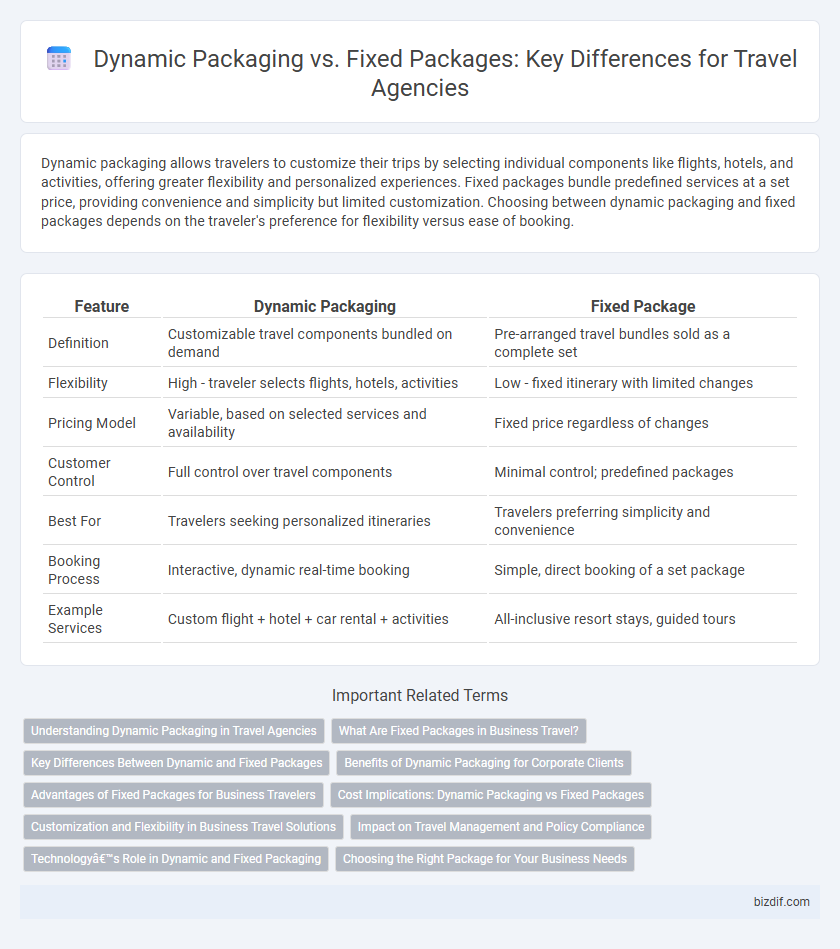Dynamic packaging allows travelers to customize their trips by selecting individual components like flights, hotels, and activities, offering greater flexibility and personalized experiences. Fixed packages bundle predefined services at a set price, providing convenience and simplicity but limited customization. Choosing between dynamic packaging and fixed packages depends on the traveler's preference for flexibility versus ease of booking.
Table of Comparison
| Feature | Dynamic Packaging | Fixed Package |
|---|---|---|
| Definition | Customizable travel components bundled on demand | Pre-arranged travel bundles sold as a complete set |
| Flexibility | High - traveler selects flights, hotels, activities | Low - fixed itinerary with limited changes |
| Pricing Model | Variable, based on selected services and availability | Fixed price regardless of changes |
| Customer Control | Full control over travel components | Minimal control; predefined packages |
| Best For | Travelers seeking personalized itineraries | Travelers preferring simplicity and convenience |
| Booking Process | Interactive, dynamic real-time booking | Simple, direct booking of a set package |
| Example Services | Custom flight + hotel + car rental + activities | All-inclusive resort stays, guided tours |
Understanding Dynamic Packaging in Travel Agencies
Dynamic packaging in travel agencies allows customers to customize their trips by selecting flights, accommodations, and activities in one seamless booking process, enhancing flexibility and personalization. Unlike fixed packages that offer pre-set itineraries and fixed pricing, dynamic packaging leverages real-time inventory and pricing data to tailor travel experiences according to individual preferences and budgets. This approach boosts customer satisfaction and can increase agency revenue by offering more diverse and competitive travel options.
What Are Fixed Packages in Business Travel?
Fixed packages in business travel refer to prearranged travel deals that bundle flights, accommodations, and other services into a single purchase with set prices and itineraries. These packages simplify the booking process by offering standardized options tailored for corporate clients, ensuring consistency and predictability in travel expenses. Fixed packages often provide negotiated rates and exclusive benefits, making them a cost-effective solution for companies managing frequent business trips.
Key Differences Between Dynamic and Fixed Packages
Dynamic packaging offers travelers the flexibility to customize flights, accommodations, and activities in real-time, tailoring their trip according to personal preferences and budget. Fixed packages provide pre-arranged itineraries with set prices and services, ensuring convenience and predictable costs for travelers seeking a straightforward booking experience. The key difference lies in dynamic packaging's adaptability versus fixed packages' predefined structure, affecting cost, control, and customization.
Benefits of Dynamic Packaging for Corporate Clients
Dynamic packaging offers corporate clients unparalleled flexibility by allowing the customization of travel components such as flights, accommodations, and transportation, tailored to specific business needs. This customization often leads to significant cost savings compared to fixed packages by enabling companies to select the most competitive options and adjust itineraries on demand. Enhanced control over travel arrangements also improves efficiency and simplifies expense management, making dynamic packaging an ideal solution for corporate travel programs.
Advantages of Fixed Packages for Business Travelers
Fixed packages offer business travelers streamlined booking with predetermined itineraries, ensuring time efficiency and predictable costs. These packages often include essential services such as airport transfers, hotel accommodations, and meeting facilities, facilitating smooth and hassle-free travel. The predefined structure aids expense management and reimbursement processes, enhancing overall convenience for corporate travel planning.
Cost Implications: Dynamic Packaging vs Fixed Packages
Dynamic packaging often leads to cost savings by allowing travelers to customize their trips and select the best prices for flights, hotels, and activities, resulting in tailored experiences at competitive rates. Fixed packages typically come with set prices that may include markups to cover bundled services, which can limit flexibility but offer predictable budgeting. Evaluating cost implications requires balancing the potential savings and personalization of dynamic packaging against the simplicity and upfront cost certainty of fixed packages.
Customization and Flexibility in Business Travel Solutions
Dynamic packaging offers unparalleled customization and flexibility by allowing business travelers to tailor flights, accommodations, and transportation according to their specific needs, optimizing both convenience and cost-efficiency. Fixed packages provide standardized itineraries with predetermined services, limiting adjustments but ensuring consistency and predictability for bulk or recurring corporate travel arrangements. Businesses seeking personalized travel solutions benefit significantly from dynamic packaging, which adapts to evolving schedules and preferences more effectively than fixed package options.
Impact on Travel Management and Policy Compliance
Dynamic packaging enhances travel management by allowing customized itineraries that align with company travel policies, promoting cost efficiency and flexibility. Fixed packages simplify policy compliance through standardized options but may limit adaptability to specific business needs or last-minute changes. Travel managers benefit from dynamic solutions by optimizing budget control and ensuring traveler adherence to corporate guidelines.
Technology’s Role in Dynamic and Fixed Packaging
Dynamic packaging leverages advanced algorithms and real-time data integration to customize travel components such as flights, hotels, and car rentals, offering travelers tailored experiences and competitive pricing. Fixed packages rely on pre-set itineraries and bundled services, often limiting flexibility but benefiting from streamlined booking processes and consistent pricing. Technology enables dynamic packaging to adapt instantly to availability and user preferences, while fixed packages utilize ERP systems to efficiently manage inventory and standardize offerings.
Choosing the Right Package for Your Business Needs
Dynamic packaging offers travel agencies flexibility by allowing customization of flights, hotels, and activities tailored to individual customer preferences, boosting customer satisfaction and potential revenue. Fixed packages provide convenience and cost-effectiveness with predefined itineraries and pricing, ideal for clients seeking straightforward travel solutions. Evaluating customer demographics and business goals helps determine whether dynamic or fixed packages align better with operational efficiency and market demand.
Dynamic Packaging vs Fixed Package Infographic

 bizdif.com
bizdif.com